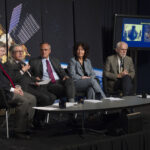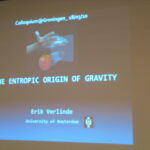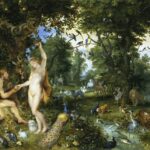What Things Really Exist? Exploring the Nature of Creation and Reality
Introduction: Understanding Creation and Reality
When we hear that God is the creator, it seems like a simple idea, but what does it really mean? What is creation, and what exactly constitutes reality? The concept of divine creation goes far beyond physical objects we can touch and see. In this exploration, we dive into the doctrine of creation, examining what “things” exist and how they relate to God’s role as the source of all existence.
The Doctrine of Creation: God’s Role as the Source of Reality
At its core, the doctrine of creation asserts that God is the source of all reality outside of Himself. Everything that exists, from the tangible physical world to the intangible realms of spiritual and abstract realities, owes its existence to God. God did not simply shape or modify existing materials but brought everything into being. This includes all physical objects, time, space, spiritual beings like angels, and even abstract concepts, if they exist.
Physical Reality: What Exists in the Material World?
The most obvious part of reality is the physical universe, made up of all the concrete objects we encounter. This includes everything from the smallest particles to the largest galaxies. It also encompasses space and time, the framework within which physical matter exists and operates. According to the doctrine of creation, these elements of physical reality have not always existed. They were brought into existence by God at a specific point in time. This means that the universe is not eternal; it had a beginning, and that beginning is rooted in God’s creative power.
Abstract Objects: Do Numbers and Logic Really Exist?
An interesting aspect of the discussion about creation is the existence of abstract objects. These include things like numbers, propositions, and even logical operations. Do these things exist independently of the physical world, or are they merely human constructs? Some philosophers argue that abstract objects are real and exist in a realm beyond physical space. If that is the case, how do they fit into the doctrine of creation?
Many theologians propose that abstract objects, like numbers and logic, are grounded in the very mind of God. In this view, numbers, mathematical truths, and logical operations are not separate, independent entities but rather expressions of God’s rational nature. They exist because God exists, and they reflect the order and consistency of God’s mind.
Fictional Entities: The Case of Sherlock Holmes
What about fictional entities, like Sherlock Holmes or characters from stories? Do they “exist” in some sense? In this case, the answer is different. Fictional entities do not exist in reality—they are creations of human imagination. However, some philosophers argue that even these creations can be considered abstract objects. This raises questions about the boundaries of existence and what qualifies as “real.”
For the most part, fictional entities like Sherlock Holmes are understood to be non-existent in any meaningful sense. They exist only as ideas in human minds and have no independent reality outside of the stories that created them.
Spiritual Realities: Beyond the Physical World
Beyond the physical and abstract realms, there is also the concept of spiritual reality. This includes entities such as angels and other spiritual beings that are believed to exist outside the physical universe. These spiritual realities are part of the “everything else” that God created. They exist in a different mode of being than physical objects, but they are still part of the overall structure of reality that depends on God for its existence.
Like physical objects, spiritual entities were brought into being by God at a specific time. They are not eternal, and their existence is contingent upon God’s creative will. This highlights the idea that everything—whether physical, spiritual, or abstract—owes its being to God and exists because He brought it into existence.
Causation and Logic: Grounded in God
Causation and logic are fundamental aspects of how we understand the world. Every event in the universe seems to be the result of a cause, and logic is the framework we use to make sense of relationships between ideas. In the context of the doctrine of creation, both causation and logic are seen as being grounded in the mind of God.
Logic, for instance, is not an independent force but is reflective of God’s rational nature. The laws of logic, such as the law of non-contradiction, are expressions of how God orders reality. Similarly, causation—the principle that every effect has a cause—flows from God’s role as the ultimate cause of all things. God’s creative act is the original cause, and every other cause-and-effect relationship in the universe is an extension of that first creative act.
Creation as a Temporal Concept
One of the most important aspects of the doctrine of creation is its connection to time. The act of creation implies that the universe and everything in it had a specific beginning. This is a key point often misunderstood. Creation is not just about dependency on God but also about the fact that things were brought into existence at a particular moment. The universe, spiritual beings, and abstract concepts all began to exist because God willed them into being.
This view counters the notion of an eternal universe, where time, space, and matter have always existed. Instead, time itself is part of the created order, and God, as the creator, exists outside of time. He initiated time when He brought the universe into existence.
Conclusion: God’s Role in the Totality of Existence
In exploring what things really exist, we see that the doctrine of creation encompasses all aspects of reality. God is the source of everything outside Himself—physical objects, abstract concepts, and spiritual beings alike. From the largest galaxy to the smallest number, everything exists because God brought it into being. Fictional entities, like Sherlock Holmes, do not truly exist, and abstract objects like numbers and logic are reflections of God’s rational nature.
Creation is inherently a temporal concept, with all things beginning at a specific moment through God’s creative will. The physical universe, spiritual realities, and the framework of logic and causation are all rooted in God’s creative act. This understanding deepens our appreciation for the vastness of what God has made and highlights the profound relationship between creation and time.
If you’re interested in learning more about this topic, I encourage you to watch this video link for further exploration.





